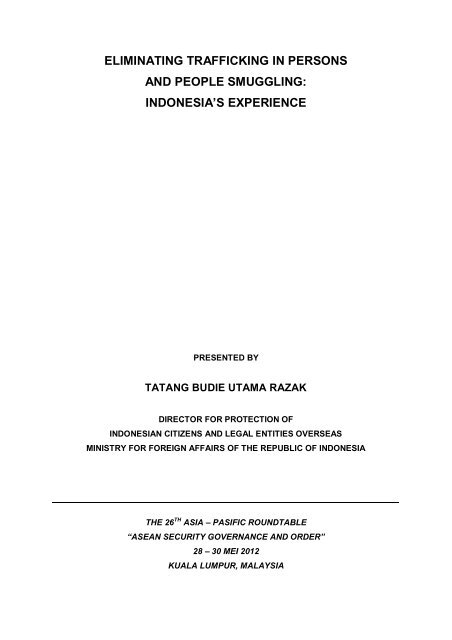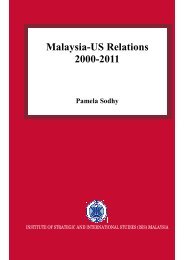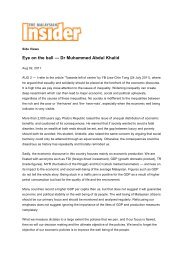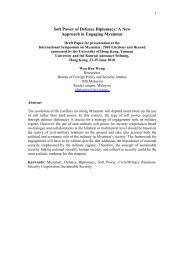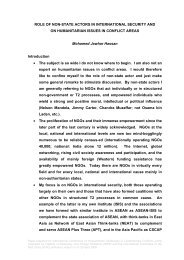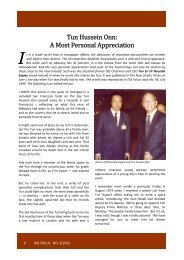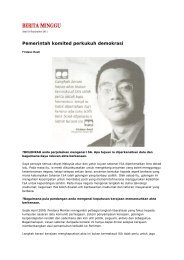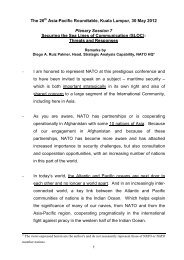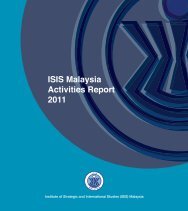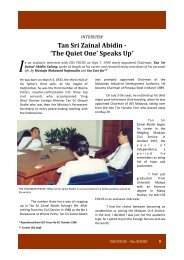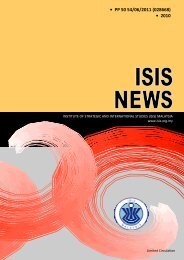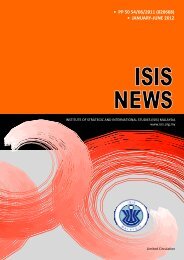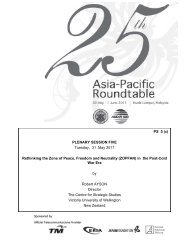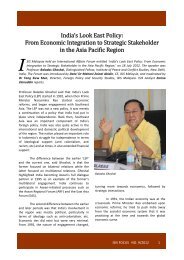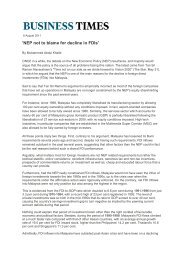eliminating trafficking in persons and people ... - ISIS Malaysia
eliminating trafficking in persons and people ... - ISIS Malaysia
eliminating trafficking in persons and people ... - ISIS Malaysia
You also want an ePaper? Increase the reach of your titles
YUMPU automatically turns print PDFs into web optimized ePapers that Google loves.
ELIMINATING TRAFFICKING IN PERSONS<br />
AND PEOPLE SMUGGLING:<br />
INDONESIA’S EXPERIENCE<br />
PRESENTED BY<br />
TATANG BUDIE UTAMA RAZAK<br />
DIRECTOR FOR PROTECTION OF<br />
INDONESIAN CITIZENS AND LEGAL ENTITIES OVERSEAS<br />
MINISTRY FOR FOREIGN AFFAIRS OF THE REPUBLIC OF INDONESIA<br />
THE 26 TH ASIA – PASIFIC ROUNDTABLE<br />
“ASEAN SECURITY GOVERNANCE AND ORDER”<br />
28 – 30 MEI 2012<br />
KUALA LUMPUR, MALAYSIA
ELIMINATING TRAFFICKING IN PERSONS AND PEOPLE SMUGGLING:<br />
INDONESIA’S EXPERIENCE<br />
A. BACKGROUND<br />
Apart from growth, movement has always been one of human’ dist<strong>in</strong>guished features<br />
as a response to pressures of resources scarcity <strong>and</strong> opportunities offered by the exploration<br />
of new l<strong>and</strong>s. Today, <strong>people</strong> are more mobile than before. Globalization <strong>and</strong> its associated<br />
phenomena such as transport, technology, economy, <strong>and</strong> media have practically given the<br />
effect of the shr<strong>in</strong>k<strong>in</strong>g the world <strong>and</strong> mak<strong>in</strong>g migration process easier for <strong>people</strong>. Accord<strong>in</strong>g<br />
to International Organization for Migration’s 2010 World Report, the total number of<br />
<strong>in</strong>ternational migrants has <strong>in</strong>creased from an estimated 150 million <strong>in</strong> 2000 to 214 million <strong>in</strong><br />
2010. Higher dem<strong>and</strong>s for labor <strong>in</strong> the developed economies <strong>and</strong> the availability of labor <strong>in</strong><br />
underdeveloped economies have become the most prom<strong>in</strong>ent push <strong>and</strong> pull factors that<br />
boost <strong>in</strong>ternational migration activities.<br />
Traditionally, movement of <strong>people</strong> across <strong>in</strong>ternational borders has been regarded<br />
as a legitimate subject of states’ control, based on the pr<strong>in</strong>ciples of sovereignty <strong>and</strong> territorial<br />
<strong>in</strong>tegrity, thus creat<strong>in</strong>g a common preconception among modern states that any migration<br />
across <strong>in</strong>ternational borders that is conducted <strong>in</strong> violation to the domestic law is not only<br />
“illegal”, but also poses a threat to security; economy; <strong>and</strong> even to sovereignty of the<br />
receiv<strong>in</strong>g state. However, this conception is now challenged as we’re look<strong>in</strong>g at the positive<br />
contribution that migration makes to the economic growth of dest<strong>in</strong>ation countries, as well as<br />
the significant amount of remittance it generates to countries of orig<strong>in</strong>. Yet, it is not to say<br />
that <strong>in</strong>ternational migration does not have downside stories. The cases of human <strong>traffick<strong>in</strong>g</strong><br />
<strong>and</strong> <strong>people</strong> smuggl<strong>in</strong>g are often associated with the stories of modern cross border<br />
migration.<br />
B. TRAFFICKING IN PERSON : INDONESIA’S EXPERIENCE<br />
1. Root Cause <strong>and</strong> Numbers<br />
United Nations (UN) estimates about 700,000 to 4 million women <strong>and</strong> children are be<strong>in</strong>g<br />
trafficked each year. 1 Almost every country is <strong>in</strong>volved <strong>in</strong> the human <strong>traffick<strong>in</strong>g</strong> activities,<br />
be<strong>in</strong>g the country of orig<strong>in</strong>, country of transit or country of dest<strong>in</strong>ation. Indonesia’s case is<br />
1 Henry Thompson, International Economics: Global Markets And Competition. London:<br />
World Scientific Publish<strong>in</strong>g (2006).
unique, as it plays all the roles as a country of orig<strong>in</strong>, transit <strong>and</strong> dest<strong>in</strong>ation of human<br />
<strong>traffick<strong>in</strong>g</strong>.<br />
In Indonesia, basically, poverty is the root of the problem. It creates <strong>in</strong>centives for<br />
rural <strong>people</strong> to migrate to urban areas <strong>and</strong> overseas <strong>in</strong> pursuit of better livelihood. Indonesian<br />
M<strong>in</strong>istry of Foreign Affairs recorded no less than 3.091.284 Indonesian citizens are currently<br />
resid<strong>in</strong>g overseas, <strong>in</strong> which 58,9% are mostly employed as domestic workers. The actual<br />
figures are estimated to be 2-to-3 times higher s<strong>in</strong>ce most Indonesian citizens do not report<br />
their residency <strong>in</strong> foreign country to the nearest Indonesian Embassies overseas. Lack<strong>in</strong>g the<br />
sufficient education, these <strong>people</strong> are often unaware of the proper migration process, thus<br />
become engaged <strong>in</strong> human <strong>traffick<strong>in</strong>g</strong> <strong>and</strong> <strong>people</strong> smuggl<strong>in</strong>g activities.<br />
Not only the fact that the numbers of the Indonesians resid<strong>in</strong>g overseas are high, but<br />
the irregular migration process that often took place is also the common trigger to the<br />
<strong>in</strong>creased numbers of Indonesians fac<strong>in</strong>g problems overseas, such as human <strong>traffick<strong>in</strong>g</strong> <strong>and</strong><br />
<strong>people</strong> smuggl<strong>in</strong>g. Add<strong>in</strong>g to the complexity of the problem is the fact that the domestic<br />
sector, <strong>in</strong> which most Indonesian migrant workers are work<strong>in</strong>g, is often unregulated <strong>in</strong> many<br />
countries. In year 2011, the M<strong>in</strong>istry recorded around 20.000 cases faced by the Indonesians<br />
overseas. Most of the cases were related to the work<strong>in</strong>g condition <strong>in</strong> receiv<strong>in</strong>g countries,<br />
such as: unpaid salary, forced labour, irregular work<strong>in</strong>g hour, sexual harassment, <strong>and</strong><br />
physical abuse. It is estimated that 100,000 women <strong>and</strong> children are trafficked from<br />
Indonesia annually 2 for commercial sexual exploitation, domestic work, forced marriages,<br />
<strong>and</strong> child labor. 3 Consequently, migration <strong>and</strong> its related issues have cont<strong>in</strong>uously been<br />
given emphasis <strong>in</strong> Indonesian domestic <strong>and</strong> foreign policies.<br />
The Modus Oper<strong>and</strong>i for human <strong>traffick<strong>in</strong>g</strong> cases <strong>in</strong>volv<strong>in</strong>g Indonesians vary widely.<br />
Recruiters usually target vulnerable groups, female <strong>and</strong> under aged girls, <strong>and</strong> give deceptive<br />
<strong>in</strong>formation about some jobs overseas. Sometimes recruiters also use threats, abuses of<br />
authority, debt bondage, marriage or relationship, abduction, conf<strong>in</strong>ement or rape as means<br />
which led to exploitation. When the victims arrived <strong>in</strong> the country of dest<strong>in</strong>ation, they were<br />
forced to work without payment or trafficked for prostitution.<br />
2 UNICEF-Indonesia, Overview-Child Protection,<br />
http://www.unicef.org/<strong>in</strong>donesia/protection.html<br />
3 Ruth Rosenberg, ed., International Catholic Migration Commission <strong>and</strong> American Center for<br />
International Labor Solidarity Traffick<strong>in</strong>g of Women <strong>and</strong> Children <strong>in</strong> Indonesia, (2003).
Aside from be<strong>in</strong>g a country of orig<strong>in</strong> for trafficked <strong>persons</strong>, Indonesia is also a<br />
dest<strong>in</strong>ation for traffickers. There have been cases of foreign women <strong>and</strong> girls trafficked to<br />
Indonesia to work <strong>in</strong> prostitution bus<strong>in</strong>ess <strong>in</strong> big cities like Jakarta <strong>and</strong> Surabaya.<br />
The Indonesian National Police’s Crime Investigation Agency reported that there are<br />
142 cases of human <strong>traffick<strong>in</strong>g</strong> <strong>in</strong> Indonesia <strong>in</strong> 2010, <strong>in</strong>volv<strong>in</strong>g 275 victims <strong>and</strong> 163<br />
traffickers. The data show relatively decreas<strong>in</strong>g trend compar<strong>in</strong>g to the statistics <strong>in</strong> year<br />
2005.<br />
Traffick<strong>in</strong>g <strong>in</strong> Persons Cases <strong>in</strong> 2005-2010<br />
NO YEAR NO. OF<br />
VICTIMS<br />
VICTIMS<br />
TRAFFICKERS<br />
PROCESSES<br />
CASES<br />
(ADULTS)<br />
(CHILDREN)<br />
1. 2005 71 125 18 86 P21: 40<br />
2. 2006 84 496 129 155 P21: 57<br />
3. 2007 177 334 240 240 P21: 88<br />
4. 2008 199 519 88 291 P21: 107<br />
5. 2009 142 208 67 163 P21: 67<br />
6. 2010 142 208 67 163 P21: 67<br />
2. National Policies to Elim<strong>in</strong>ate Traffick<strong>in</strong>g <strong>in</strong> Persons<br />
As a consequence of the ratification of the UN Convention Aga<strong>in</strong>st Transnational<br />
Organized Crime <strong>and</strong> Protocol to Prevent, Suppress, <strong>and</strong> Punish Traffick<strong>in</strong>g <strong>in</strong> Persons,<br />
Especially Women <strong>and</strong> Children, Supplement<strong>in</strong>g the United Nations Convention aga<strong>in</strong>st<br />
Transnational Organized Crime, the Government of Indonesia adopted national laws <strong>and</strong><br />
regulation, along with policy reform to improve the national collective effort <strong>in</strong> combat<strong>in</strong>g<br />
human <strong>traffick<strong>in</strong>g</strong>.<br />
a. National Legislation<br />
In 2007, the Government of Indonesia enacted the Law Number 21 Year 2007<br />
regard<strong>in</strong>g the Elim<strong>in</strong>ation of the Crime of Traffick<strong>in</strong>g <strong>in</strong> Persons that adopts a comprehensive<br />
approach to address<strong>in</strong>g human <strong>traffick<strong>in</strong>g</strong>. Before the enactment of this Law, the punishment<br />
for the traffickers rely on the provisions set forth <strong>in</strong> the Indonesian Crim<strong>in</strong>al Code, Indonesian<br />
Crim<strong>in</strong>al Code Procedures, Law Number 23 Year 2002 on Child Protection, Law Number 39<br />
Year 1999 on Human Rights, <strong>and</strong> Law Number 26 Year 2000 on the Court of Human Rights.
Additionally, the Government of Indonesia ratified ILO Convention No. 182 on the<br />
Worst Form of Child Labor <strong>in</strong> 2000 <strong>and</strong> the Protocol to Prevent, Suppress <strong>and</strong> Punish<br />
Traffick<strong>in</strong>g <strong>in</strong> Persons, Especially Women <strong>and</strong> Children Supplement<strong>in</strong>g the United Nations<br />
Convention Aga<strong>in</strong>st Transnational Organized Crime <strong>in</strong> 2009. The commitments are further<br />
strengthened <strong>in</strong> 2012 through the ratification of the International Convention on the<br />
Protection of the Rights of All Migrant Workers <strong>and</strong> Members of Their Families.<br />
1) Protection of Victim<br />
Protection for <strong>traffick<strong>in</strong>g</strong> victims <strong>in</strong>clude activities: putt<strong>in</strong>g them <strong>in</strong> safe places, return<strong>in</strong>g<br />
them (to their homel<strong>and</strong>s or to their home countries) <strong>in</strong>clud<strong>in</strong>g efforts to provide legal aid <strong>and</strong><br />
accompaniment, rehabilitation (physical <strong>and</strong> psychological health recovery), re<strong>in</strong>tegration<br />
(reunit<strong>in</strong>g them with their families or with their communities) <strong>and</strong> empowerment efforts (<strong>in</strong><br />
economic <strong>and</strong> education sectors) so victims will not fall aga<strong>in</strong> <strong>in</strong>to <strong>traffick<strong>in</strong>g</strong> <strong>in</strong> <strong>persons</strong>. 4<br />
The Law No. 21/2007 provides the follow<strong>in</strong>g protections for the victims:<br />
1) Victims shall have the rights to bear witness without appear<strong>in</strong>g before the court;<br />
2) Victims of human <strong>traffick<strong>in</strong>g</strong> are protected <strong>in</strong> accordance to the Law Number 13 Year<br />
2006 on The Protection of Witness <strong>and</strong> Victims;<br />
3) Victims <strong>and</strong> family members of victims shall have the right of identity undisclosure;<br />
4) Victims shall have the right to receive restitution <strong>in</strong> regards to their suffer<strong>in</strong>g, medical<br />
coverage or other losses as a result of the crime.<br />
For Indonesians who become victims of human <strong>traffick<strong>in</strong>g</strong> abroad, Indonesian missions<br />
overseas bear the responsibilities to provide protection. This obligation is set forth <strong>in</strong> as<br />
regulated <strong>in</strong> Law No. 7 Year 1999 on International Relations. The protection <strong>in</strong>clude among<br />
others: health services, counsel<strong>in</strong>g <strong>and</strong> adm<strong>in</strong>istrative assistance, safe shelter <strong>and</strong> return<strong>in</strong>g<br />
them to Indonesia. 5 To coord<strong>in</strong>ate the missions<strong>in</strong> carry<strong>in</strong>g their protection mission is the<br />
responsibility of the Directorate for Indonesian Citizens <strong>and</strong> Legal Entities Protection, the<br />
Directorate General of Protocol <strong>and</strong> Consular Services, the M<strong>in</strong>istry of Foreign Affairs.<br />
4 Coord<strong>in</strong>at<strong>in</strong>g M<strong>in</strong>istry For People’s Welfare, The Elim<strong>in</strong>ation of Traffick<strong>in</strong>g <strong>in</strong> Persons <strong>in</strong><br />
Indonesia, 2004-2005.<br />
5 Coord<strong>in</strong>at<strong>in</strong>g M<strong>in</strong>istry For People’s Welfare, The Elim<strong>in</strong>ation of Traffick<strong>in</strong>g <strong>in</strong> Persons <strong>in</strong><br />
Indonesia, 2004-2005.
2) Prevention of Traffick<strong>in</strong>g <strong>in</strong> Persons<br />
Efforts to prevent <strong>traffick<strong>in</strong>g</strong> <strong>in</strong> <strong>persons</strong> have been implemented by mapp<strong>in</strong>g <strong>traffick<strong>in</strong>g</strong><br />
<strong>in</strong> <strong>persons</strong> cases <strong>in</strong> Indonesia - as domestic <strong>and</strong> <strong>in</strong>ternational dest<strong>in</strong>ations, <strong>in</strong>creas<strong>in</strong>g public<br />
education - especially alternative education for children <strong>and</strong> women, <strong>in</strong>clud<strong>in</strong>g its facilities<br />
<strong>and</strong> <strong>in</strong>frastructure, <strong>and</strong> rais<strong>in</strong>g the public’s awareness by provid<strong>in</strong>g sufficient <strong>in</strong>formation on<br />
<strong>traffick<strong>in</strong>g</strong> <strong>in</strong> <strong>persons</strong> <strong>and</strong> all related issues <strong>in</strong> media, <strong>and</strong> secur<strong>in</strong>g access for families,<br />
especially women <strong>and</strong> children to obta<strong>in</strong> education, tra<strong>in</strong><strong>in</strong>g, higher <strong>in</strong>come <strong>and</strong> social<br />
services. The efforts <strong>in</strong>volve all government <strong>and</strong> private sectors <strong>and</strong> (national <strong>and</strong><br />
<strong>in</strong>ternational) NGOs, <strong>in</strong>ternational organizations, community organizations, <strong>in</strong>dividuals, <strong>and</strong><br />
mass media.<br />
b. The National Plan of Action on the Eradication of Traffick<strong>in</strong>g <strong>in</strong> Persons <strong>and</strong><br />
Sexual Exploitation of Children (RAN PTTPO & ESA) 2009 – 2014.<br />
The action plan target is to <strong>in</strong>crease national efforts to elim<strong>in</strong>ate <strong>traffick<strong>in</strong>g</strong> <strong>in</strong> <strong>persons</strong>,<br />
which <strong>in</strong>clude prevention, prosecution <strong>and</strong> severe punishments on traffickers, <strong>and</strong> victim<br />
protection through repatriation, rehabilitation, counsel<strong>in</strong>g, education <strong>and</strong> skills tra<strong>in</strong><strong>in</strong>g. In<br />
addition to the above mentioned action plans, there are other national plans of action that<br />
support the effort to the elim<strong>in</strong>ate <strong>traffick<strong>in</strong>g</strong> of <strong>persons</strong>, namely: the National Plan of Action<br />
on the Elim<strong>in</strong>ation of the Worst Forms of Child Labor (Presidential Decree No. 59 Year<br />
2002), the National Plan of Action on the Elim<strong>in</strong>ation of Sexual Exploitation of Children<br />
(Presidential Decree No. 87 Year 2002), <strong>and</strong> the 2004-2009 National Plan of Action on<br />
Human Rights (Presidential Decree No. 40 Year 2004).<br />
3. Achievement<br />
In the Country Programme for Indonesia 2012-2015, UNODC has noted the<br />
Government of Indonesia’s effort to proactively improve its ability to combat the transnational<br />
organized crime <strong>and</strong> illicit <strong>traffick<strong>in</strong>g</strong>, especially through the ratification of several critical<br />
<strong>in</strong>ternational legal <strong>in</strong>struments perta<strong>in</strong><strong>in</strong>g to the issue. Domestically, the Government has<br />
steadily <strong>in</strong>creased the capacity of its <strong>in</strong>stitutional actors <strong>and</strong> agencies, <strong>in</strong>clud<strong>in</strong>g the tra<strong>in</strong><strong>in</strong>g<br />
of special units to combat TOC <strong>and</strong> <strong>traffick<strong>in</strong>g</strong>, <strong>and</strong> has successfully prosecuted <strong>and</strong><br />
convicted <strong>in</strong>dividuals for such offences. At <strong>in</strong>ternational level, along with the Government of<br />
Australia, Indonesia co-chairs the Bali process, which br<strong>in</strong>gs together over 50 countries to<br />
work on practical measures to combat <strong>traffick<strong>in</strong>g</strong> <strong>in</strong> <strong>persons</strong> <strong>and</strong> smuggl<strong>in</strong>g of migrants.
Certa<strong>in</strong>ly, the elim<strong>in</strong>ation of <strong>traffick<strong>in</strong>g</strong> <strong>in</strong> <strong>persons</strong> activities <strong>in</strong> Indonesia is still a work <strong>in</strong><br />
progress. Yet, Government has made its commitments through the adoption of laws <strong>and</strong><br />
policies to cont<strong>in</strong>ue combat<strong>in</strong>g human <strong>traffick<strong>in</strong>g</strong>. Challenges we are now fac<strong>in</strong>g are how to<br />
improve the capacity of national <strong>in</strong>stitution <strong>and</strong> officials deal<strong>in</strong>g with <strong>traffick<strong>in</strong>g</strong> <strong>in</strong> <strong>persons</strong>, as<br />
well as to perform a good border management on our vast coastl<strong>in</strong>e of 56,716 kilometres <strong>and</strong><br />
numerous isl<strong>and</strong>s spread across the country, to protect these areas from the traffickers <strong>and</strong><br />
smugglers that want to use them as entry <strong>and</strong> exit po<strong>in</strong>ts for their illegal activities.<br />
C. PEOPLE SMUGGLING<br />
Just like human <strong>traffick<strong>in</strong>g</strong>, <strong>people</strong> smuggl<strong>in</strong>g is a grow<strong>in</strong>g global crime that exposes<br />
thous<strong>and</strong>s of migrants to unacceptable risks <strong>and</strong> challenges the <strong>in</strong>tegrity of <strong>in</strong>ternational<br />
borders. In the last two decades, globalization <strong>and</strong> conflicts have led to the <strong>in</strong>crease <strong>in</strong><br />
<strong>in</strong>ternational migration flows. Given the restrictive immigration policies put <strong>in</strong> place by the<br />
dest<strong>in</strong>ation countries <strong>and</strong> the improvement of human <strong>and</strong> technological resources deployed<br />
at borders <strong>in</strong> order to better monitor entry <strong>and</strong> exit movements, many migrants lack<strong>in</strong>g the<br />
means to reach their country of dest<strong>in</strong>ation legally are becom<strong>in</strong>g the object of crim<strong>in</strong>al groups<br />
specializ<strong>in</strong>g <strong>in</strong> <strong>people</strong> smuggl<strong>in</strong>g.<br />
The hazardous travel undertaken by these migrants may sometimes be short <strong>and</strong><br />
direct, but at other times lengthy <strong>and</strong> circuitous. The duration between departure <strong>and</strong> arrival<br />
can vary from few days to months or even years. Smugglers use l<strong>and</strong>, sea <strong>and</strong> air routes, but<br />
their it<strong>in</strong>eraries can evolve rapidly when detected by border officials. Very often travel<br />
conditions are difficult, dangerous <strong>and</strong> sometimes deadly. At their dest<strong>in</strong>ation, hav<strong>in</strong>g<br />
crossed the <strong>in</strong>ternational border unlawfully, migrants are confronted with their illegal status<br />
<strong>and</strong> usually have very limited means to <strong>in</strong>tegrate successfully <strong>in</strong>to the new country’s society.<br />
For organized crime groups, smuggl<strong>in</strong>g <strong>people</strong> across borders is a “low-risk, high<br />
profit” bus<strong>in</strong>ess. The International Organization for Migration stated that profitability of<br />
smuggl<strong>in</strong>g for organized crim<strong>in</strong>al groups is estimated at USD 3 to 10 billion a year 6 .<br />
6<br />
The International Organization for Migration <strong>and</strong> People Smuggl<strong>in</strong>g 2011, IOM’s<br />
Immigration <strong>and</strong> Border Management Programmes, available at<br />
http://www.iom.<strong>in</strong>t/jahia/Jahia/about-migration/manag<strong>in</strong>g-migration/manag<strong>in</strong>g-migrationirregular-migration/consequences-of-<strong>traffick<strong>in</strong>g</strong>-<strong>and</strong>-policy-responses.
Smugglers still benefit from weak legislation <strong>and</strong> relatively slim risks of be<strong>in</strong>g<br />
detected, arrested <strong>and</strong> prosecuted. Moreover, numerous other crimes are often l<strong>in</strong>ked to<br />
<strong>people</strong> smuggl<strong>in</strong>g, human <strong>traffick<strong>in</strong>g</strong>, identity fraud, corruption <strong>and</strong> money launder<strong>in</strong>g. This<br />
creates shadow governance systems that undercut the rule of law. Regard<strong>in</strong>g the situation,<br />
<strong>in</strong>ternational cooperation between concerned States’ law enforcement agencies,<br />
International organizations <strong>and</strong> other relevant actors need to be enhanced.<br />
1. Indonesia as Transit Country for People Smuggl<strong>in</strong>g Activities<br />
Indonesia is a major zone for smuggl<strong>in</strong>g of migrants, often en route to Australia. Given<br />
Indonesia’s geographic position, its porous borders <strong>and</strong> the relatively stable political situation<br />
<strong>in</strong> the last decade, the archipelago has become the transit po<strong>in</strong>t for many risky voyages to<br />
Australia. These migrants usually come from Asian countries which are still struggl<strong>in</strong>g for<br />
political stability <strong>and</strong> security such as Afghanistan, Iran, Iraq, Sri Lanka <strong>and</strong> Myanmar. The<br />
United Nations High Commissioner for Refugees revealed that there were more than 2,800<br />
refugees <strong>and</strong> asylum seeker transit<strong>in</strong>g <strong>in</strong> Indonesia <strong>in</strong> 2011 to seek asylums from Australian<br />
government 7 . By late 2011, IOM had more than 1.800 <strong>people</strong> under its care 8 . As not every<br />
new arrivé has the chance to register with any of these two organizations, it can be assumed<br />
that the numbers of unreported cases are at least twice as high.<br />
In certa<strong>in</strong> conditions, the arrival of these asylum seekers can lead to <strong>people</strong> smuggl<strong>in</strong>g<br />
activities. Many asylum seekers are suspected of enter<strong>in</strong>g Indonesia with forged travel<br />
identity documents before try<strong>in</strong>g to head illegally for Australia. The proportion of asylum<br />
seekers who use illegal migration channels, most notably smuggl<strong>in</strong>g, to circumvent restrictive<br />
admission policies <strong>in</strong> advanced <strong>in</strong>dustrial countries are <strong>in</strong>creas<strong>in</strong>g 9 . In response to this<br />
dem<strong>and</strong>, <strong>people</strong> smugglers have emerged <strong>and</strong> then facilitate illegal entry attempts across<br />
<strong>in</strong>ternational borders.<br />
As a transit country, Indonesia has different policies when deal<strong>in</strong>g with the arrival of<br />
migrants compared with dest<strong>in</strong>ation countries such as Australia or New Zeal<strong>and</strong>. Indonesia<br />
7 UNHCR UN Refugee Agency <strong>in</strong> Indonesia 2011 available at http://www.unhcr.or.id/en/<br />
8 Antje Missbach <strong>and</strong> Frieda S<strong>in</strong>anu 2011, ‘The Scum of the Earth? Foreign People<br />
Smugglers <strong>and</strong> Their Local Counterparts <strong>in</strong> Indonesia’,Journal of Current Southeast Asian<br />
Affairs, available at http://hup.sub.uni-hamburg.de/giga/jsaa/article/viewFile/501/499<br />
9<br />
Hannah Purdy 2010, ‘People Smugglers: The Other ‘Boat-People’’, available at<br />
http://eview.anu.edu.au/anuuj/vol2_10/pdf/ch01.pdf
only allows those who entered the country without proper documentations to rema<strong>in</strong> <strong>in</strong><br />
Indonesia if they have applied for asylum seeker status at the UNHCR office <strong>in</strong> the country.<br />
Illegal migrants who are found by the authorities without any UNHCR Letter of documents<br />
that determ<strong>in</strong>ed their status, would end up at the immigration detention centers. However,<br />
the Indonesian government does allow refugees to rema<strong>in</strong> <strong>in</strong> Indonesia until a suitable<br />
solution is found for them by <strong>in</strong>ternational migrant organizations such as the UNHCR <strong>and</strong><br />
IOM.<br />
Indonesia is not a Party to the 1951 Refugee Convention <strong>and</strong> its 1967 Protocol.<br />
Therefore Indonesia is not obliged to provide any assistance to asylum seekers <strong>and</strong> refugees<br />
<strong>in</strong> Indonesia, be it <strong>in</strong> terms of surviv<strong>in</strong>g <strong>in</strong> the country or <strong>in</strong> resettlement process.<br />
Nevertheless, the government allows <strong>in</strong>ternational organizations like IOM <strong>and</strong> UNHCR<br />
through its implement<strong>in</strong>g partner organization to work with, <strong>and</strong> support, asylum seekers <strong>and</strong><br />
refugees. In addition to that, Indonesia does not have national legislation on the Rights <strong>and</strong><br />
Integrat<strong>in</strong>g Mechanism of Refugees with Local Community. Due to that, the role of Indonesia<br />
<strong>in</strong> support<strong>in</strong>g UNHCR is limited to provid<strong>in</strong>g shelters <strong>and</strong> logistics to the migrants until they<br />
are be<strong>in</strong>g granted the official status of asylum seeker from the Dest<strong>in</strong>ation Country.<br />
2. National Law perta<strong>in</strong><strong>in</strong>g to People Smuggl<strong>in</strong>g<br />
In mid 2011, Indonesia’s parliament has passed tough new law aimed at fight<strong>in</strong>g<br />
<strong>people</strong> smuggl<strong>in</strong>g under Law no. 6/2011 on Immigration. Smugglers, corrupt immigration<br />
officials who often assist <strong>people</strong> smugglers <strong>and</strong> those who fail to report <strong>persons</strong> guilty of<br />
immigration violations could face 5 to 15 years <strong>in</strong> prison 10 . Before the ratification of the law,<br />
<strong>people</strong> smugglers have been prosecuted for simple immigration violations or breaches of the<br />
maritime law which carry a relatively light sentence. However, without strict border controls<br />
<strong>and</strong> firm authorities to oversee the implementation of the rules of law, <strong>people</strong> smugglers will<br />
always be able to f<strong>in</strong>d loop holes to ma<strong>in</strong>ta<strong>in</strong> their activities.<br />
3. Indonesia’s Vulnerability from People Smuggl<strong>in</strong>g Activities<br />
Although Indonesia is not a dest<strong>in</strong>ation country for <strong>people</strong>-smuggl<strong>in</strong>g, the country is still<br />
vulnerable of <strong>people</strong> smuggl<strong>in</strong>g activities which <strong>in</strong>volves Indonesian citizens. Many poor<br />
villagers who live as farmers or fishermen are be<strong>in</strong>g persuaded by “agents”. These agents,<br />
10 Matt Brown 2011, ‘Indonesia Passes Laws Crim<strong>in</strong>aliz<strong>in</strong>g People Smuggl<strong>in</strong>g’ available at<br />
http://www.abc.net.au/news/2011-04-07/<strong>in</strong>donesia-passes-laws-crim<strong>in</strong>alis<strong>in</strong>g<strong>people</strong>/2624376
then, offered a good amount of money to those farmers or fishermen <strong>and</strong> lured them on to<br />
the boats on false pretences. Most of these farmers or fishermen did not realize that the boat<br />
they are supposed to navigate will travel outside Indonesia’s territory (Australia). The<br />
Indonesian government is aware that most Indonesians who are be<strong>in</strong>g deta<strong>in</strong>ed <strong>in</strong> Australia<br />
for <strong>people</strong>-smuggl<strong>in</strong>g cases do not have major roles <strong>in</strong> the boat. In contrary, they are victims<br />
of the real smugglers because they are merely <strong>in</strong>volved as transporters <strong>and</strong> service<br />
providers. Their <strong>in</strong>volvement <strong>in</strong> <strong>people</strong>-smuggl<strong>in</strong>g activities is also ma<strong>in</strong>ly pushed by poverty.<br />
One of the ma<strong>in</strong> concerns of Indonesia is the use of many under-aged <strong>and</strong><br />
<strong>in</strong>experienced Indonesian nationals who are be<strong>in</strong>g used to transport the human cargo to<br />
dest<strong>in</strong>ation countries. These young <strong>people</strong> are becom<strong>in</strong>g ma<strong>in</strong> targets due to its cheap<br />
“labor” costs. Based on data from embassy <strong>and</strong> consulate generals of Indonesia <strong>in</strong> Australia,<br />
until May 2012, there are 451 Indonesians who are be<strong>in</strong>g deta<strong>in</strong>ed for <strong>people</strong> smuggl<strong>in</strong>g<br />
cases where 28 of them claim of be<strong>in</strong>g under-age. Furthermore, there is a tendency of<br />
<strong>in</strong>censement <strong>in</strong> the number of Indonesians <strong>in</strong>volved <strong>and</strong> convicted of <strong>people</strong> smuggl<strong>in</strong>g<br />
activities s<strong>in</strong>ce 2008. Derived from Indonesian embassy <strong>and</strong> consulate generals <strong>in</strong><br />
Australia’s data, <strong>in</strong> 2009 <strong>and</strong> 2010 there is a rise of 19%. In 2011, the percentage <strong>in</strong>creases<br />
to 39%.<br />
These young <strong>people</strong> are be<strong>in</strong>g imprisoned as adults until they can show legal proofs<br />
that they are m<strong>in</strong>ors. If they are found to be m<strong>in</strong>ors legally, they will be immediately released<br />
from adult detention <strong>and</strong> sent home. The ma<strong>in</strong> issue is that most of the deta<strong>in</strong>ees come from<br />
poor families without sufficient knowledge about immigration <strong>and</strong> border rules. With this<br />
limitation, it is unsurpris<strong>in</strong>g that they are not able to run a successful defense case.<br />
Unfortunately, very few of these Indonesians knew the penalties that await them. Those<br />
penalties <strong>in</strong>clude m<strong>and</strong>atory prison sentences of five years with a non-parole period of 3 up<br />
to 20 years of imprisonment. 11<br />
11 Australian Institute of Crim<strong>in</strong>ology 2008, ‘People Smuggl<strong>in</strong>g versus Traffick<strong>in</strong>g <strong>in</strong> Persons:<br />
What is the Difference?’, Transnational Crime Brief no. 02, 2008, available at<br />
http://www.aic.gov.au/documents/F/2/2/%7BF226C525-F4D9-4AEC-B6D8-<br />
424A7E44C27B%7Dtcb002.pdf
D. INTERNATIONAL COOPERATION IN ELIMINATING TRAFFICKING IN PERSONS<br />
AND PEOPLE SMUGGLING<br />
To address the issue of <strong>traffick<strong>in</strong>g</strong> <strong>in</strong> <strong>persons</strong> <strong>and</strong> <strong>people</strong> smuggl<strong>in</strong>g, the Government<br />
of Indonesia recognized that there are needs to establish cooperation among states,<br />
especially among countries of orig<strong>in</strong>, countries of transit <strong>and</strong> countries of dest<strong>in</strong>ation, to<br />
elim<strong>in</strong>ate the crimes of <strong>traffick<strong>in</strong>g</strong> <strong>in</strong> person <strong>and</strong> <strong>people</strong> smuggl<strong>in</strong>g.<br />
1. Bilateral Cooperations<br />
At the bilateral level, Indonesia has signed MoUs to ensure the protection of<br />
Indonesian migrant workers with countries of dest<strong>in</strong>ation. In 2006, for example, the<br />
Government of Indonesia <strong>and</strong> the Government of <strong>Malaysia</strong> has signed MoU on the<br />
Recruitment <strong>and</strong> Placement of Indonesian Domestic Workers, which then amended on 30<br />
May 2011. The MoU regulates the rights <strong>and</strong> obligations of both the employers <strong>and</strong><br />
employees <strong>in</strong> the dest<strong>in</strong>ation country such as <strong>Malaysia</strong>. The MoU is expected to prevent any<br />
k<strong>in</strong>d of abuses towards migrant workers that leads to the crime of <strong>traffick<strong>in</strong>g</strong> <strong>in</strong> <strong>persons</strong> or<br />
<strong>people</strong> smuggl<strong>in</strong>g. The Government of Indonesia cont<strong>in</strong>uously pushed other countries of<br />
dest<strong>in</strong>ation to sign similar agreements to ensure the protection of Indonesian migrant<br />
workers.<br />
To address the problems of <strong>people</strong> smuggl<strong>in</strong>g, Indonesia has also been cooperat<strong>in</strong>g<br />
with Australia as one of the ma<strong>in</strong> Dest<strong>in</strong>ation Country <strong>in</strong> the region. In November 2006,<br />
Indonesia <strong>and</strong> Australia signed Lombok Treaty, a comprehensive security treaty which<br />
<strong>in</strong>cludes combat<strong>in</strong>g transnational crime, development of police cooperation to combat<br />
refugee flows <strong>and</strong> the means to tackle <strong>people</strong> smuggl<strong>in</strong>g activities. Furthermore, at the 9 th<br />
Australia-Indonesia M<strong>in</strong>isterial Forum <strong>in</strong> 2008, the meet<strong>in</strong>g produced a Jo<strong>in</strong>t Statement on<br />
People Smuggl<strong>in</strong>g that roundly denounced the practice as a crime <strong>and</strong> restated the need to<br />
counter the issue, both bilaterally <strong>and</strong> regionally. This agreement complimented the exist<strong>in</strong>g<br />
field level cooperation between l<strong>in</strong>e agencies of the two countries. Australia has, for example,<br />
equipped Indonesian patrol boats with satellite navigation <strong>and</strong> other <strong>in</strong>telligence measures<br />
for <strong>in</strong>tercept<strong>in</strong>g boats, among other gestures.<br />
The Indonesian Police has also established a special task-force to combat <strong>people</strong><br />
smuggl<strong>in</strong>g. Until mid-2010, there were already 12 task-forces at regional police comm<strong>and</strong>s<br />
around Indonesia. S<strong>in</strong>ce 2010, more than 140 boats carry<strong>in</strong>g asylum seekers have been
<strong>in</strong>tercepted <strong>in</strong> Indonesian waters <strong>and</strong> countless others have been prevented from depart<strong>in</strong>g<br />
due to the efforts of the Indonesian police 12 . Many illegal migrants also travel to Indonesia<br />
through <strong>Malaysia</strong>, mak<strong>in</strong>g the Prov<strong>in</strong>ce of Riau Isl<strong>and</strong>s as the key entry po<strong>in</strong>t. S<strong>in</strong>ce then,<br />
Indonesian <strong>and</strong> <strong>Malaysia</strong>n police have been develop<strong>in</strong>g cooperation <strong>in</strong> tighten<strong>in</strong>g maritime<br />
border control between the two countries.<br />
The different status between Indonesia as Transit Country <strong>and</strong> Australia as Dest<strong>in</strong>ation<br />
Country who is a Party of the UN Convention 1951 leads to different responsibilities of each<br />
country on h<strong>and</strong>l<strong>in</strong>g the issue. Australia has repeatedly pushed Indonesia to accept greater<br />
responsibility for manag<strong>in</strong>g migrant flows such as to readmit asylum seekers who have fled<br />
Indonesian territory but have been <strong>in</strong>tercepted by Australian border control forces on the high<br />
seas. On the other h<strong>and</strong>, the government firmly believes that as a transit country such<br />
responsibility should not be bestowed upon Indonesia 13 . Indonesia is will<strong>in</strong>g to offer strong<br />
stated commitments to combat <strong>people</strong> smuggl<strong>in</strong>g, but shoulder<strong>in</strong>g responsibility as much as<br />
the responsibility of the Dest<strong>in</strong>ation Country is a different proposition.<br />
Bilateral co-operations between Indonesia <strong>and</strong> countries such as Australia <strong>and</strong><br />
<strong>Malaysia</strong> have the aim to combat the problem of human <strong>traffick<strong>in</strong>g</strong> <strong>and</strong> <strong>people</strong> smuggl<strong>in</strong>g.<br />
However there are still problems <strong>in</strong> the process which needs to be addressed further. Border<br />
controls between countries need to be tightened, maritime patrols need to be enhanced <strong>and</strong><br />
differences <strong>in</strong> legislation which deals with the issue should be put <strong>in</strong>to consideration.<br />
2. Regional Cooperation<br />
Over the past several years, Indonesia <strong>and</strong> other ASEAN Member States have<br />
affirmed the importance of stronger <strong>and</strong> more effective regional <strong>and</strong> <strong>in</strong>ternational cooperation<br />
<strong>in</strong> the area of <strong>traffick<strong>in</strong>g</strong> <strong>in</strong> <strong>persons</strong> <strong>and</strong> <strong>people</strong> smuggl<strong>in</strong>g. ASEAN Member States are<br />
committed to prevent <strong>traffick<strong>in</strong>g</strong> <strong>in</strong> <strong>persons</strong>, punish<strong>in</strong>g the crim<strong>in</strong>als <strong>and</strong> protect<strong>in</strong>g victims of<br />
<strong>traffick<strong>in</strong>g</strong> ASEAN recognizes that cooperation <strong>in</strong> these areas is vital to successful domestic<br />
prosecutions as well as to elim<strong>in</strong>ate safe havens for traffickers, smugglers <strong>and</strong> their<br />
12<br />
Antje Missbach <strong>and</strong> Frieda S<strong>in</strong>anu 2011, ‘The Scum of the Earth? Foreign People<br />
Smugglers <strong>and</strong> Their Local Counterparts <strong>in</strong> Indonesia’,Journal of Current Southeast Asian<br />
Affairs, available at http://hup.sub.uni-hamburg.de/giga/jsaa/article/viewFile/501/499<br />
13 Antje Missbach <strong>and</strong> Frieda S<strong>in</strong>anu 2011, ‘The Scum of the Earth? Foreign People<br />
Smugglers <strong>and</strong> Their Local Counterparts <strong>in</strong> Indonesia’,Journal of Current Southeast Asian<br />
Affairs, available at http://hup.sub.uni-hamburg.de/giga/jsaa/article/viewFile/501/499
accomplices. The issue of human <strong>traffick<strong>in</strong>g</strong> <strong>and</strong> <strong>people</strong> smuggl<strong>in</strong>g themselves have become<br />
ma<strong>in</strong> concerns of ASEAN even back <strong>in</strong> 1997 at the 2 nd Informal ASEAN Summit <strong>in</strong> Kuala<br />
Lumpur 14 .<br />
Thus, a number of <strong>in</strong>struments have been developed to support such cooperation.<br />
ASEAN already has a treaty on mutual legal assistance <strong>in</strong> crim<strong>in</strong>al matters which was<br />
completed <strong>in</strong> 2006 <strong>and</strong> a set of guidel<strong>in</strong>es endorsed by the Senior Official Meet<strong>in</strong>g on<br />
Transnational Crime (SOMTC) <strong>in</strong> 2007 to deal with the two issues. The commitment of the<br />
regional association towards this issues are also expressed <strong>in</strong> the ASEAN Declaration<br />
aga<strong>in</strong>st Traffick<strong>in</strong>g <strong>in</strong> Persons, especially Women <strong>and</strong> Children, the ASEAN Declaration<br />
aga<strong>in</strong>st Transnational Crime <strong>and</strong> the ASEAN Vision 2020.<br />
The different roles of each country, either as Orig<strong>in</strong>, Transit or Dest<strong>in</strong>ation Country, put<br />
different perspectives on view<strong>in</strong>g the urgency of the issue. This affects the effectiveness of<br />
these <strong>in</strong>ternational co-operations to produce legal <strong>in</strong>struments or outcomes which will give<br />
stronger <strong>and</strong> firmer framework on tackl<strong>in</strong>g the problem of transnational crimes, <strong>in</strong>clud<strong>in</strong>g<br />
human <strong>traffick<strong>in</strong>g</strong> <strong>and</strong> <strong>people</strong> smuggl<strong>in</strong>g. ASEAN is long<strong>in</strong>g to have a convention on<br />
transnational crime but with different <strong>in</strong>terests from its member countries, this has to wait.<br />
3. Multilateral Cooperation<br />
Indonesia is also <strong>in</strong>volved <strong>in</strong> <strong>in</strong>ternational fora which put great emphasis on the<br />
term<strong>in</strong>ation of illicit transnational migration <strong>in</strong> Asia Pacific. One of the ma<strong>in</strong> forum where<br />
Indonesia has an active role is <strong>in</strong> the Bali M<strong>in</strong>isterial Conference on People Smuggl<strong>in</strong>g,<br />
Traffick<strong>in</strong>g <strong>in</strong> Persons <strong>and</strong> Related Transnational Crime or similarly known as the Bali<br />
Process. This forum was launched <strong>in</strong> 2002 <strong>and</strong> it gathers 46 orig<strong>in</strong>, transit <strong>and</strong> dest<strong>in</strong>ation<br />
countries from throughout the region with UNHCR <strong>and</strong> IOM to combat the issue 15 . Indonesia,<br />
with Australia, is co-chair<strong>in</strong>g the forum which tries to foster regional cooperative efforts<br />
through technical workshops <strong>and</strong> <strong>in</strong>creases cooperation between <strong>in</strong>terested countries <strong>and</strong><br />
agencies such as the IRC <strong>and</strong> Interpol. Country participants of Bali Process acknowledge the<br />
14<br />
S. Pushpanathan 1999, ‘Combat<strong>in</strong>g Transnational Crime <strong>in</strong> ASEAN’, available at<br />
http://unpan1.un.org/<strong>in</strong>tradoc/groups/public/documents/apcity/unpan011390.pdf<br />
15 International Organization for Migration 2002, ‘Bali M<strong>in</strong>isterial Conference on People<br />
Smuggl<strong>in</strong>g, Traffick<strong>in</strong>g <strong>in</strong> Persons <strong>and</strong> Related Transnational Crime (Bali<br />
Conference/Process)’, available at http://www.iom.<strong>in</strong>t/jahia/Jahia/about-migration/manag<strong>in</strong>gmigration/manag<strong>in</strong>g-migration-irregular-migration/consequences-of-<strong>traffick<strong>in</strong>g</strong>-<strong>and</strong>-policyresponses
contributions of the forum on help<strong>in</strong>g them build<strong>in</strong>g a shared <strong>in</strong>formation platform among its<br />
members. The forum also emphasis the urgency of strengthen<strong>in</strong>g cooperation on Mutual<br />
Legal Assistance (MLA) <strong>and</strong> law enforcement <strong>in</strong>volv<strong>in</strong>g crimes related to <strong>people</strong> smuggl<strong>in</strong>g<br />
<strong>and</strong> <strong>traffick<strong>in</strong>g</strong> <strong>in</strong> <strong>persons</strong>.<br />
Although these <strong>in</strong>ternational co-operations brought many advantages for its<br />
participants, the disparities of legal frameworks between countries led to discrepancies <strong>in</strong><br />
cooperation on law enforcement. Those discrepancies sometimes become the ma<strong>in</strong> obstacle<br />
for the implementation of assistances provided by the forum which give difficulties for the<br />
cooperation of country participants to succeed <strong>in</strong> tackl<strong>in</strong>g the issue <strong>in</strong> the region. Thus,<br />
harmonization of legal cooperation procedures with<strong>in</strong> the region is very crucial if all of the<br />
country participants want to tackle <strong>people</strong> smuggl<strong>in</strong>g activities <strong>in</strong> Asia Pacific.<br />
E. CONCLUSION<br />
The crimes of <strong>traffick<strong>in</strong>g</strong> <strong>in</strong> <strong>persons</strong> <strong>and</strong> <strong>people</strong> smuggl<strong>in</strong>g are serious concerns to<br />
many countries due to the <strong>in</strong>creas<strong>in</strong>g trend of the number of victims. As these crimes take<br />
place cross-borders, thus, concerted efforts of the states are required to prevent <strong>and</strong><br />
prosecute the perpetrators of such crimes, as well as to protect the victims. This requires not<br />
only efforts of the governments, but all stakeholders at any levels, <strong>in</strong>clud<strong>in</strong>g NGO’s, scholars<br />
<strong>and</strong> the entire civil society.


